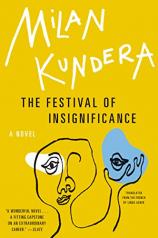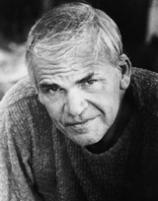The Festival of Insignificance
Review
The Festival of Insignificance
Milan Kundera's latest work of fiction, THE FESTIVAL OF INSIGNIFICANCE, isn't likely to detract from the estimable reputation he established in novels like THE BOOK OF LAUGHTER AND FORGETTING and THE UNBEARABLE LIGHTNESS OF BEING, but neither will it add to it. What he and his publisher call a novel (in truth, more a novella at barely 100 pages), is short on plot, while its sketchily developed characters serve principally as vehicles for the 86-year-old Czech expatriate's discourse on a handful of intellectual preoccupations.
The work is set in contemporary France, where Kundera has lived for the past 40 years, but except for opening and closing scenes in the Luxembourg Gardens, it unfolds in a time and space vacuum. Five men of indeterminate age and social status meet, talk, drift apart and reconnect, as they explore subjects that include the exposed navel as a fashion statement and as a revelation that "individuality is an illusion," free will, what causes some people to be "apologizers" and the nature of humor.
"When you reflect on the hour or two it will take you to read Kundera's book, you won't necessarily think that time has been wasted. But it's unlikely you'll find that it has contained much that's significant."
Two characters are preoccupied by thoughts of their mothers. One of them, Alain, engages in a recurring internal dialogue with the woman who tried to abort him in an unwanted pregnancy by attempting to drown herself, while Charles obsesses over his mother's failing health. A good portion of the novel is set at a party thrown by a character named D'Ardelo, who inexplicably informs his former co-worker Ramon that the medical tests that revealing he doesn't suffer from cancer, in fact, have disclosed a terminal diagnosis. The final member of the quintet of principal characters, Caliban, a friend of Charles and an actor moonlighting as a waiter at the party, amuses himself by inventing fake languages ("Pakistani" on this evening), but even this trick has grown stale and he finds himself an "actor without an audience." These static scenes aren't relieved by glimpses (recounted from a Nikita Khruschev memoir Charles is reading) of meetings of the Soviet leadership in the days of Josef Stalin that focus on Mikhail Kalinin, whose urinary problems become a subject of mockery by the Communist tyrant.
The principal problem is Kundera's refusal or inability to engage any of his ostensible subjects in a sustained way. As a result, the idle chatter bobs along, as weightless and inconsequential as the object described in the party scene entitled "A Little Feather Floats Beneath the Ceiling." It's impossible to resist feeling that Kundera is simply playing a joke on us, as when Ramon tells Caliban, "We've known for a long time that it was no longer possible to overturn this world, nor reshape it, nor head off its dangerous headlong rush. There's been only one possible resistance: to not take it seriously." Unfortunately, as Ramon concludes, and at least as demonstrated here, "our jokes have lost their power."
As Ramon and D'Ardelo encounter each other again at Luxembourg Gardens at the end of the novella, Ramon offers a summing up of the subject that is the book's central concern:
"Insignificance, my friend, is the essence of existence. It is all around us, and everywhere and always. It is present even when no one wants to see it: in horror, in bloody battles, in the worst disasters. It often takes courage to acknowledge it in such dramatic situations, and to call it by name. But it is not only a matter of acknowledging it, we must love insignificance, we must learn to love it…. Breathe, D'Ardelo, my friend, inhale this insignificance that's all around us, it is the key to wisdom, it is the key to a good Mood…"
That's a discouraging, if not depressing, message to anyone for whom life involves a search for meaning. When you reflect on the hour or two it will take you to read Kundera's book, you won't necessarily think that time has been wasted. But it's unlikely you'll find that it has contained much that's significant. In that sense, perhaps THE FESTIVAL OF INSIGNIFICANCE has served to make his point.
Reviewed by Harvey Freedenberg on June 26, 2015
The Festival of Insignificance
- Publication Date: June 14, 2016
- Genres: Fiction
- Paperback: 128 pages
- Publisher: Harper Perennial
- ISBN-10: 0062356909
- ISBN-13: 9780062356901




